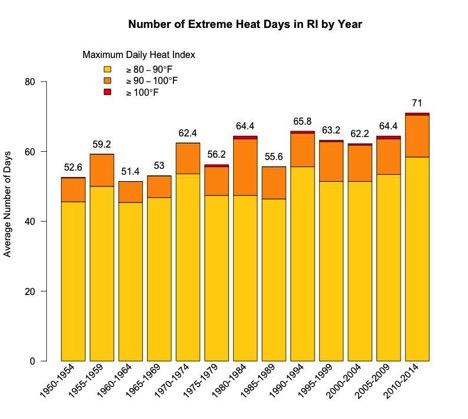PROVIDENCE, R.I. [Brown University] — A new, unpublished analysis conducted by Brown University researchers of weather data collected at T.F. Green airport over the last 60 years shows a significant rise in the number of extremely hot days.
“Our previous work showed that climate change will lead to higher rates of emergency hospitalizations for heat in Rhode Island. What we didn’t know was just how much Rhode Island has already warmed,” said co-author Gregory Wellenius, associate professor of epidemiology in the Brown University School of Public Health. Last month he co-authored a study showing that as temperatures rise above 80 degrees, Rhode Islanders become more likely to end up in the hospital or die.
The new follow-up analysis, conducted by biostatistician Melissa Eliot and supervised by Wellenius and sociologist Timmons Roberts shows that the number of extreme heat days in Rhode Island each year has gone up by nearly a third. In the 1950s and 1960s, an average summer included 54 days with a heat index above 80 degrees. In the 1970s and 1980s, the average rose to almost exactly 60 days a year. By the 1990s and 2000s, that average had climbed to nearly 64 days. Most strikingly, Roberts said, the first five years of the 2010s have seen summers with an average of 71 days with heat index over 80. That is two and a half weeks of more superhot days than in the 50s and 60s.
“People perceive that summers are getting longer — these striking numbers show they are right,” said Roberts, the Ittleson Professor of Environmental Studies and professor of sociology. “The implications are vast for health but also in many other areas of life in Rhode Island. Levels of greenhouse gas emissions are having their predicted effects, but even sooner than predicted. This should be a wake-up call right here at home on the need for ambitious action on climate change.”

